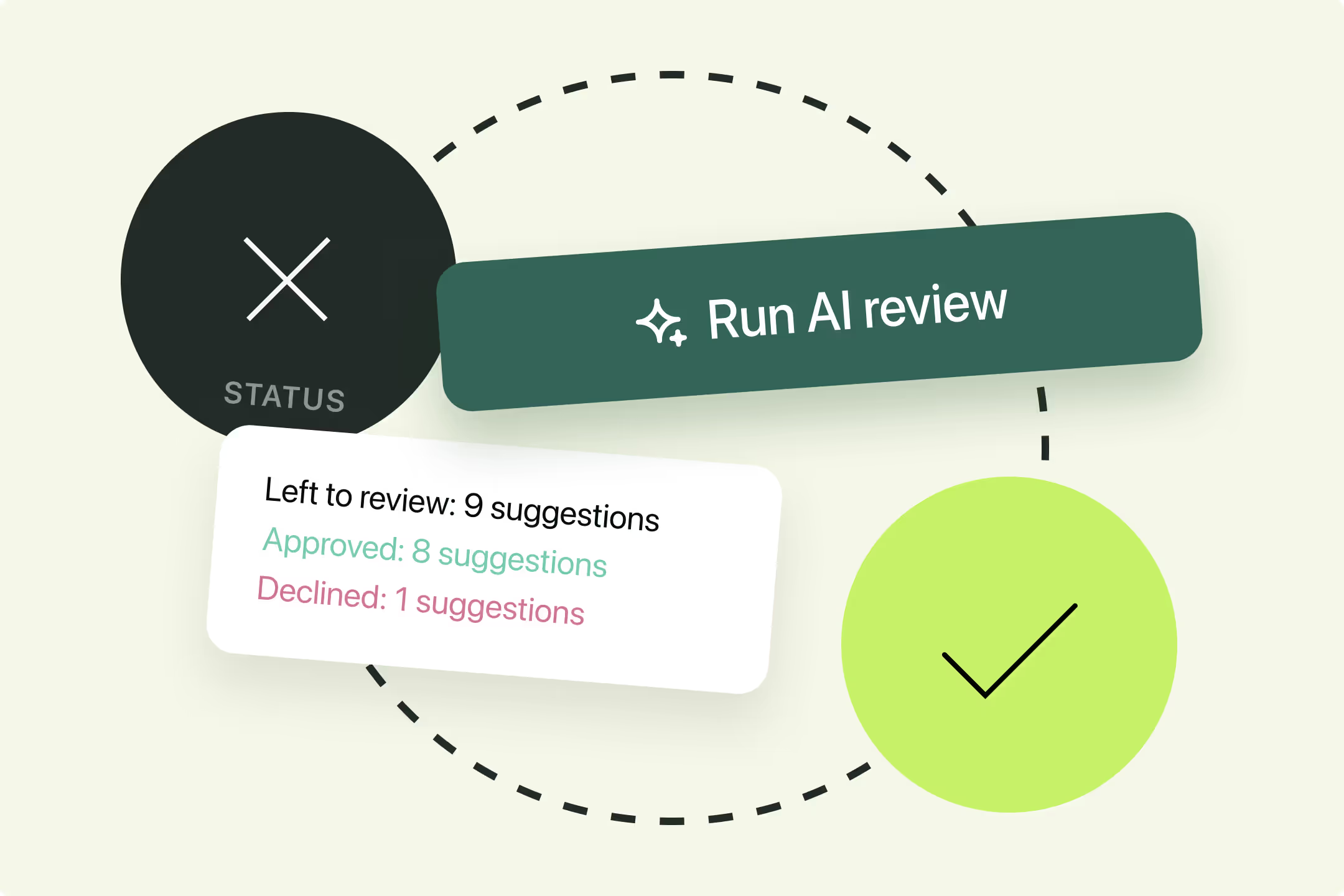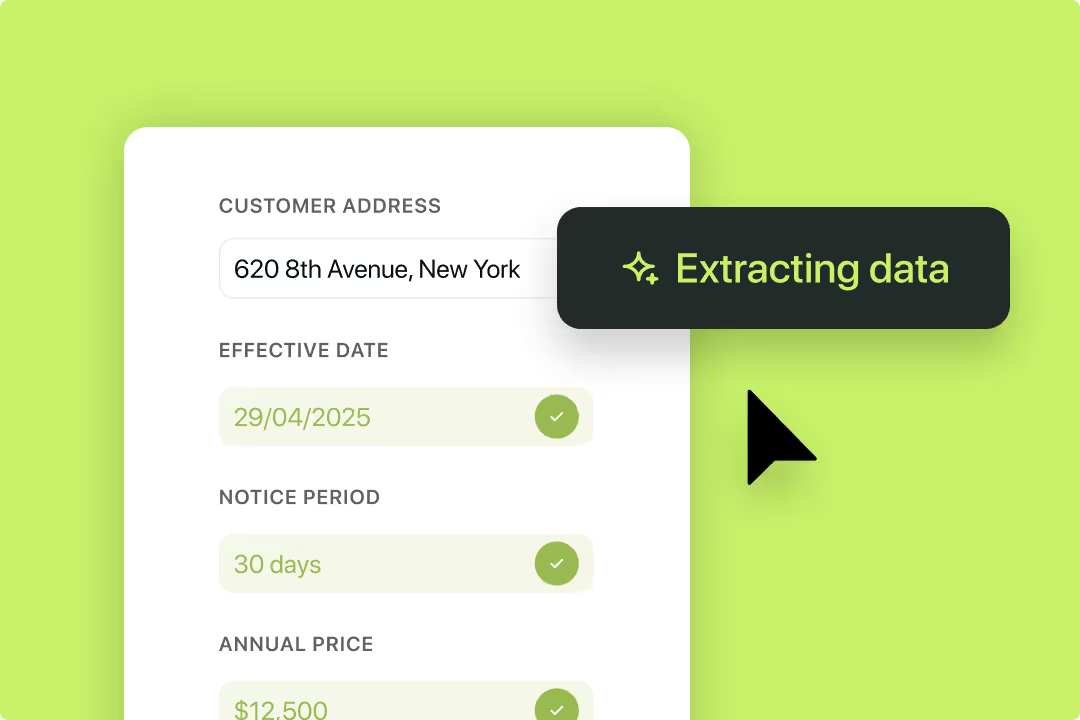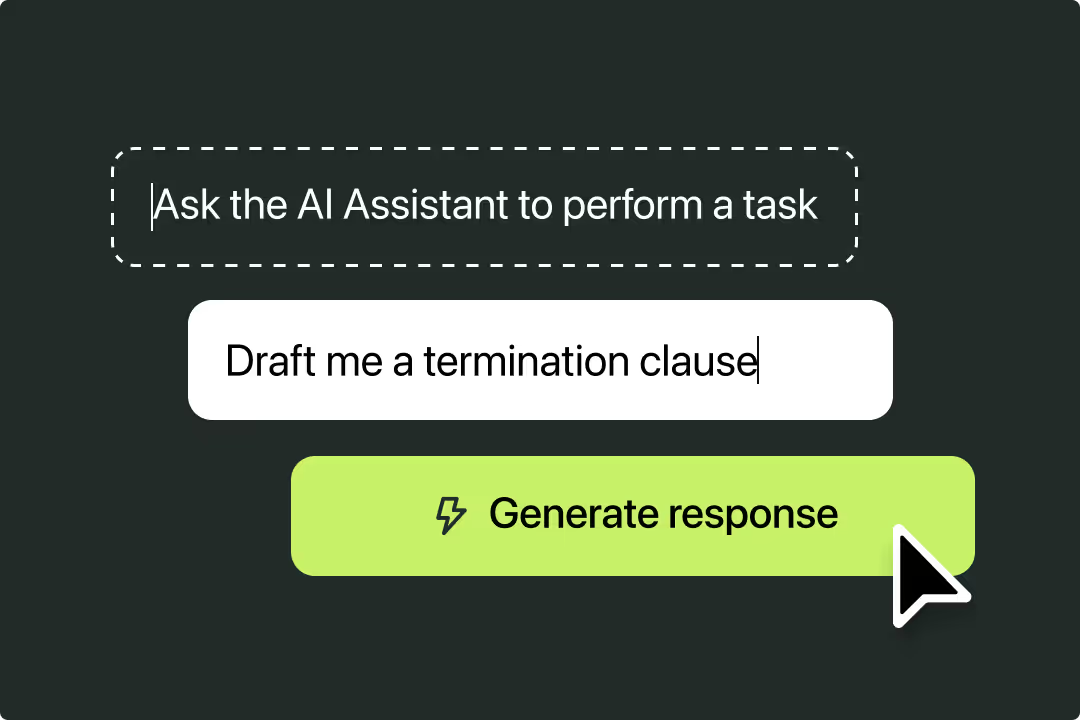Solutions
Customer Support
Resources
Contract AI is becoming increasingly popular in the legal industry, with vendors selling the promise of reduced admin and faster contracting processes if they invest.
But what actually is contract AI, and can it deliver value that other tools can’t?
The short answer is yes. Juro’s AI helps you draft, summarize and review contracts ten times faster than with human-led processes. By automating repetitive admin, this kind of contract AI empowers businesses to agree contracts faster and dedicate their time to higher-value tasks.

To find out more about how Juro’s intelligent contract automation platform can transform your contract process, hit the button below for your personalized demo of the tool. If you want to learn more about contract AI and how it works first, keep reading.

Contract AI describes the use of text-based machine learning applied to contracts to make the process of drafting, reviewing, and tracking contracts more efficient.
Like a human lawyer, contract AI begins by understanding and familiarising itself with the language used in legal contracts.
To do this, the algorithms that power contract AI tools are trained to identify and flag patterns and behaviors in contracts. This enables the AI to recognize key terms, phrases, and concepts by repeatedly seeing words and phrases in context.
Contract AI then applies this advanced understanding of contracts to reduce repetitive contract admin tasks throughout the contract lifecycle.
For example, contract AI software can automatically extract important contract metadata and highlight specific terms of interest, like the governing law, effective date, or personal information. Without AI involvement, this information would need to be tagged and captured manually by lawyers.

Generative AI also uses large language models (LLMs) to generate contract drafts in seconds, with guardrails that you can set and control. These LLMs can also be used to identify key risks within a contract, allowing you to focus on more complex matters when reviewing and negotiating contracts.
At Juro, we believe that generative AI can unlock much better solutions in CLM. We’re calling the next generation of CLM “Intelligent Contract Automation”.
Aided by AI, lawyers will end up executing fewer tasks in CLM. They will shift from being the front-end users of CLM to being back-end users. What I mean by this is that if lawyers can set the right playbooks and guardrails for contracts, there is no reason why folks outside of legal cannot self-serve on contract tasks.
Imagine a month end where lawyers are brought in only on the most critical legal points, with almost all deal advice and negotiation on AI autopilot. Lawyers typically don’t get much pleasure from addressing the same points again and again in an impossibly short timeframe. With AI, properly and safely deployed, we won’t have to.
And the industry is ready to embrace this development, with our recent survey of in-house lawyers revealing that more than 90 per cent use ChatGPT, Claude, or Gemini either daily or weekly. Almost all (99 per cent) of those we spoke to believe it will change their job a year from now. And they aren't wrong.
Even in the last two years, the potential has grown exponentially. It’s early days, but the direction of travel is clear. Legal AI is moving from task-based tools to intelligent, proactive systems that work alongside lawyers — not just as assistants, but as autonomous teammates. In other words, legal AI agents.
{{quote2}}
The benefits of using AI to manage your contracts mirror many of the broader benefits of AI in the corporate world. Contract AI unlocks:
However, the biggest benefit for in-house lawyers is that it substantially reduces the amount of low-value work that lands on their desk. It's no wonder 93 per cent of those in-house lawyers believe their boss wants them to use AI more than they are currently.

Contract AI is a broad category of AI-powered contract tools, so it’s important to understand exactly what AI contract management platforms are available and where they can add value. To help you do that, we’ve listed the three main categories of contract AI below.
AI-powered contract drafting tools can generate contracts in seconds based on the information you provide in your prompt. This means that this type of contract AI can automate the contract drafting process while also allowing you to customize them to meet your specific needs and use cases.
AI contract drafting software tends to be a point solution, though. In other words, it delivers value at the contract drafting stage of the lifecycle but doesn’t offer functionality to help with the other stages of the lifecycle, like getting a contract negotiated, signed, stored, and tracked.

AI contract review software is used to automatically find, extract and flag important data points and deviations within a contract, often against a pre-defined and optimized contract playbook or policy.
By doing this, the software makes it quicker and easier for teams to review their agreements.
Certain AI contract review tools, like contract intelligence software and contract analysis software, will also evaluate risk within a contract and flag any areas of concern. This is beneficial to lawyers preparing to enter the negotiation phase of the contract lifecycle as it gives them a clear understanding of which points to focus on.
Again, the main limitation of many AI contract review tools is that they don't deliver end-to-end functionality for those managing contracts, or benefit from the rich context stored within a contract repository.
That isn't the case when you use a contract platform like Juro. Juro's contract review agent is embedded within your existing workflows, while giving you the rich data captured in an end-to-end contract automation platform.
{{quote1}}
An all-in-one solution like Juro enables teams to leverage AI to draft and review contracts, but it also lets users:
This enables businesses to leverage the various benefits of contract AI while also making the rest of the contract lifecycle faster, more efficient, and less painful.
With AI coming on leaps and bounds in recent years, there are plenty of AI offerings on the market right now, and contract software is no exception.
But not all contract AI solutions are born equal. Lots of vendors have built AI that delivers value during one stage of the contract lifecycle (e.g AI contract negotiation software).
Few have created a tool that delivers value and drives efficiency at every stage while also protecting your privacy and keeping your legal team in the driving seat.
Juro’s legal AI does all of these things, making Juro the only platform that combines AI with an all-in-one, browser-native collaboration platform.
Juro’s AI assistant lives within our contract management platform which already offers features to streamline the entire contract lifecycle. Unlike point solutions built in MS Word, Juro users can manage their contracts from start to finish in one place, without having to leave their browser.
This means you only need one platform. No more jumping between eSigning tools, Word files and shared drives.
Juro has a rich set of features that empower your team to manage contracts within the platform from drafting all the way through to contract reporting and renewals. This makes Juro a business-wide system of record, not just a tool for legal teams.
Lawyers are risk-averse, and rightfully so. It’s crucial that contracts are drafted carefully and with the right precautions in place.
That’s why Juro’s contract AI assistant allows you to set your own guardrails for contracts.
For example, Juro users can set negotiation parameters like “we won’t agree to liability caps in excess of $1m” and trust that these will be reflected in the output of the AI when prompted.
In other words, Juro’s contract AI isn’t free to negotiate whatever it wants. Instead, Juro’s AI Assistant is carefully directed by lawyers and acts as a partner for them - not a replacement.
Amidst the hype of AI, we’re seeing a lot of new vendors entering the market. However, some have forgotten that contracts are your most sensitive business documents, and they almost always contain personal data. This is one of the biggest risks associated with AI.
Meanwhile, Juro’s AI Assistant was designed with privacy in mind. What does that mean? Well, we offer EEA hosting for our interaction with GPT and have committed not to use customer data to train aggregated models.
Juro is also already SOC2 Type 2 compliant and holds the IASME certification for GDPR compliance. We’ve been prioritizing contract management security for a long time now, so our data processes were at the gold standard long before we introduced contract AI. This hasn’t changed.
AI data extraction tools provide a powerful way to capture and compile important contract data. But these contracts still need to live in a contract database or repository.
Since Juro contracts’ smartfields are actually built as metadata, contractual obligations can be located and viewed quickly in tables and dashboards - even without AI. In fact, Juro users even have the option to set up automatic reminders for certain obligations and dates through using Juro’s intuitive contract repository.

Juro users can create custom contract dashboard views where they can see all of the important contract values like contract type, owner, modification date, client and more at once. They can even filter these to find specific collections of contracts and report on these.
This provides one single source of truth for businesses when it comes to their contracts, making it just as effective, if not more, for legal teams to maintain full ownership and visibility into the company’s contracts.
Juro is an intelligent contracting platform that embeds AI contract automation in the tools business teams use every day, so they can agree and manage contracts end-to-end - while legal stays in control.
Juro is the #1-rated contracting platform for ease of use, and the solution of choice for fast-scaling businesses like Deliveroo, Trustpilot, Pfizer, AJ Bell, Velocity Global and so many more.
If you want to join the 6000+ companies already using Juro to power their contracts, fill in the form below to book your personalized demo today.
Lorem ipsum dolor sit amet, consectetur adipiscing elit. Suspendisse varius enim in eros elementum tristique. Duis cursus, mi quis viverra ornare, eros dolor interdum nulla, ut commodo diam libero vitae erat. Aenean faucibus nibh et justo cursus id rutrum lorem imperdiet. Nunc ut sem vitae risus tristique posuere.

